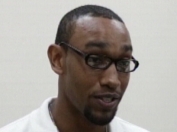
Bryton Codd

Greg Nunez
Criminalising Poverty: The High Cost of Security
Citizen security remains a contentious topic in Belize as views increasingly coalesce toward the alienation of our young Black men from society. We are being asked to barter our voices and displeasure for silence and security without discussing important social, economic, and political issues that affect their daily lives. Recently, this discursive process of “othering” has reduced complex social interactions to a rudimentary contrast of ‘us’ (the perceived law-abiding citizens) and ‘them’ (the monsters) by stigmatising them at every chance. The pronouncements by those in authority that they must learn how to live among us help to negate their identity as fellow Belizeans to justify punitive actions by the State. Meanwhile, our social media platforms are plastered with their images provided by our authorities in a clear attempt at labeling them as criminals before any criminal charges are levied. The final manifestation of this criminalisation by our criminal justice system is the implementation of a State of Emergency (SOE) that is nothing short of preventative detention, and therefore, deservedly should be a target of our criticism.
The reality of a growing economic disparity between the most disenfranchised people in southside Belize City and those of our affluent business and political leaders in the northside is grossly overlooked. The United Nations Rapporteur on Extreme Poverty, Phillip Alston, in his July 2020 report, boldly challenged our political leaders by declaring that “poverty is a political choice.” As advantages for those placed in better economic positions are multiplicative, so too are the disadvantages, which COVID-19 is sure to exacerbate, for those from the lower economic stratum. Since the former has more access to resources that will maintain their place in the stratification order of Belizean society, those who have less access are more likely to remain where they are as generational exclusion and disadvantage continue to make their climb an improbable one.
It is troubling that the attempt to retort the human sciences is based on a poor foundation that some members of our society choose to engage in criminal activity when, in fact, this classification is limited to people in inner-city communities, especially since many in our border districts and towns engage in an informal economy that is based on cheaper products and goods from across the border. So, perhaps a closer look at the social landscape of Belize City might yield a better understanding of what contributes to social violence, and can help to explain a recent trend in other districts. Many studies have confirmed the links between lower family socioeconomic status and higher levels of antisocial behaviour; or growing up in a gang populated environment and the likelihood of joining gangs; or struggling homes and impoverished neighbourhoods and the chances of interacting with delinquent peers; or adverse family environments and the likelihood of arrest at younger ages and number of arrests before age 17. Also, multiple studies, including the Country Poverty Assessment (2009), Gayle et al (2010) and an ongoing study (to be published) have found that young people in Southside Belize City have fewer years of schooling and are less likely to complete secondary school. We also know that the southside has the weakest ecological footprint that is unparalleled in Belize, with 83 percent of adolescents being aggressive or moderately aggressive. Though historically gangs have been concentrated in Belize City, their recent foothold and increasing influence in other districts have made it a concern for Orange Walk Town, Dangriga, and Punta Gorda. We are witnessing a rise in gang activity and homicide among young men as social and economic precarity threaten their ontological security. Hence, it is becoming a national issue and ought to be treated with greater understanding.
Having said that, our criminal justice system is increasingly demonstrating a lack of empathy and understanding of the complexities of the lives of the people they deal with, and what is most frightening is that they are teaching us not to. While many juveniles accused of a crime in Belize are unable to afford legal representation as found by the American Bar Association in its Rule of Law Initiative report of 2010, we are seeing a further erosion of their legal right to representation and defense under the SOEs, since 2018. This is despite the Convention on the Rights of the Child calling for “children and youths who are accused of, being held for or charged with a crime, are extended the same rights of representation and appeal as an adult in Belize; from arrest to sentencing. It also requires that a distinct juvenile justice system be established for juveniles, which stresses positive rather than punitive motivation.” Instead, we are being asked to support a pretext that all these young men are directly responsible for the handful of murders and other crimes each time they occur. The legitimisation of this view always requires the grouping of crimes (murder, robbery, extortion, etc.) to compel our support with little explanation of the institutional deficiencies regarding criminal investigations other than a basic deferral to witness intimidation.
There is a reason we have one of the highest per capita ratios of police to citizens in the entire Western Hemisphere (with a 77 percent increase between 2010 and 2016, and continues to grow) but struggle to grapple with rising crime and violence that has metastasised beyond Belize City. It is because policing is not by nature designed to reduce crime, it responds to it. Therefore, we cannot ignore the statistics and social disadvantages of these young men as a way to discount their experiences and support our narrowed perspective from our privileged statuses. We bristle at the comments of our leaders when they can propose corporal punishment or the unmitigated abuse of our citizens because they think they are “monsters.” The suggestion that parents should physically punish their children to correct them so that those tasked to protect and serve would not have to beat or shoot them is deeply disturbing. Since the data on child abuse in Belize between 2006 and 2010 from the Department of Human Services (at which point many of these young men were children) suggested that Belize District, particularly Belize City, accounted for most of the child abuse referrals, we can juxtapose that corporal punishment and other forms of abuse within homes were not in shortage. The notion that corporal punishment is the solution for crime and violence in Belize represents an unfortunate lack of compunction by a generation that fails to understand that social inequality has and continues to be the primary culprit that the ‘village’ should rally against. Ironically, police officers who have had countless complaints that have plagued our daily news at a comparable rate as other alleged criminals, have received the benefit of formal investigations regardless of the nature of the accusations, including murder, rape, domestic violence, and other serious crimes. It seems, then, that corporal punishment was not a sufficient deterrent for those bad apples.
The Black Lives Matter (BLM) movement in the United States has influenced many other movements in different countries to confront their own contextualised injustices. What is perhaps most disappointing in Belize, is the lack of recognition that the BLM movement has real-life considerations in Belize. Undoubtedly, there is disproportionate police abuse toward young Black men and by extension their families in Belize. While most homicides in Belize are committed by young men, we must consider the effects of arbitrarily arresting and confining young Black men without the State’s complete transparency on the merit of those arrests. Legal representation in our democracy is one of the few ways that we can hold the system and those in authority accountable. The suspension of the rights of these young men, including immediate access to legal representation, helps to promulgate their dehumanisation and widen the gap between us and them. Yet, the SOE under its special powers designation, allows the State to abdicate its legal responsibility at the detriment of many who are deliberately caught in a dragnet, as seen with the recent release of two-thirds of the young men after the traumatisation of both themselves and their families. More disturbingly, it is not just about the “monsters” because systems of oppression are interconnected, so we all have a Black friend or family member who has been unfairly profiled and targeted with no probable cause by the police who “want a search” (i.e. Stop and Frisk). We are confident that our police officers are aware that this is in contravention to the Protection of Fundamental Rights and Freedoms section 9(1) that protects from arbitrary search or entry. Therefore, it is incumbent on us to explore the manifestations of systemic racism, classism, and sexism in Belize, and amplify the voices of the disadvantaged, rather than threaten them with brute force in response to their legitimate complaints of wanton police abuse and destruction of property.
Perhaps we should revisit our blanket support for policing as the solution. The reliance on the SOE is not a failure of the Belize Police Department (BPD), but a representation of the lack of polarity of thought in decision making and the poor involvement of the social sector to frame and remedy the underlying factors that affect our communities. The BPD has, therefore, been unjustly tasked to respond to deep-seated systemic and structural inequalities with an incongruent policing strategy. The organogram of the BPD treats community policing as a defined unit rather than a philosophy that informs the policies and practices of the BPD. The Commissioner of Police, Chester Williams, has an opportunity, unlike his predecessors, to implement community policing throughout the Department rather than a regression to hard-line policing that has resulted in frequent complaints of police abuse of authority, with mothers and children left traumatised, young men with serious injuries, and the property of the already destitute severely damaged. The adoption of such a hard approach ultimately overlooks our severely disenfranchised communities’ ability to self-actualise (Maslow’s Hierarchy of Needs). As stated by Criminal Justice professor Kendra Hoyt, “the SOE bypasses all the mechanisms which constitute the criminal justice system.” This draconian approach undercuts all investigative procedures and expedites entry into the criminal justice system, regardless of status, starting with the interaction with the police and ending with their incarceration.
This process of labeling and criminalisation of our young Black men further compromises their future opportunities by deepening their social exclusion, including reducing their educational and job prospects, and severely limiting their social networks by further confining them to their neighbourhoods. It is not sufficient to call for attitudinal or behavioural changes without addressing long-standing economic and social inequalities that are the antecedents to social violence. Yet, despite decades of discussion on the implementation of restorative justice practices in our communities to serve as a mechanism to facilitate conflict resolution, reduce gang retaliations and recidivism, and facilitate the reintegration of offenders back into society, we continue to observe a reprisal culture led by the State. Therefore, in the absence of a clearly articulated strategy, we propose a return to the objectives of the strategic plan of RESTORE Belize that had the support and collaboration of governmental and non-governmental entities, though for whatever unspecified reasons were not realised. It is time we revisit the coordination unit tasked with addressing the risk factors that contribute to social violence in Belize by improving the quality of life of citizens through the restoration of law and order, community building, and restorative justice. We do not have to reinvent the wheel. We must quickly respond with retooling RESTORE Belize with strong leadership and highly qualified staff that can re-energise our partners and hit the ground running to operationalise the developmental objectives outlined under the three pillars of Human Development; Economic Development and Citizen Prosperity; and Democratic Governance and Citizen Security.
Greg Nunez is a final year PhD candidate studying Social Policy in the UK with a concentration on the permanent exclusion of young men from education, criminal offending, and wider social exclusion.
Bryton Codd is an MSc candidate studying in Canada on Leadership and Management with a focus on Polarity Management and Governance.
First published in Amandala Friday Issue dated July 17, 2020 and reshared with the permission of Greg Nunez.









